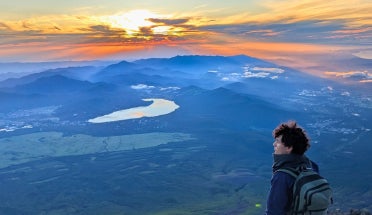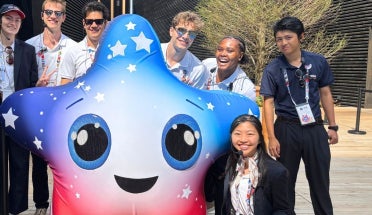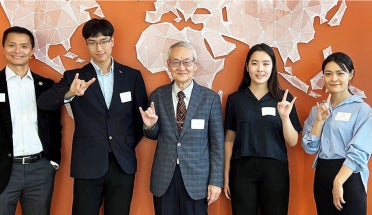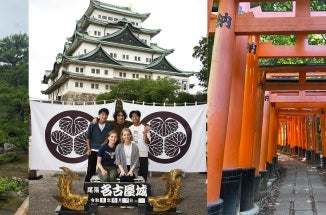
Sisters Collaborate on President’s Award Project in Japan
- Nov 20, 2024
- Education Abroad
- by Alex Briseño
Editor's Note: This story is part of a series amplifying International Education Week (IEW), a nationwide initiative celebrating global education and exchange worldwide. Each year during IEW, Texas Global highlights internationally focused news stories and events held across campus throughout the week.
It wasn’t until they boarded the flight to Tokyo together that Sarah and Sophia Snapp — sisters from Clear Lake, Texas, who are seniors at The University of Texas at Austin — believed they were really getting to spend a month in Japan for a President’s Award for Global Learning research project.
As the signature program of UT Austin's International Board of Advisors, the President’s Award for Global Learning empowers faculty and students to explore real-world interdisciplinary topics by equipping teams with funding to conceptualize and implement projects around the world.
In partnership with Tokyo Metropolitan University, “The Sustainable and Resilient Smart City in Japan” project focuses on disaster-resilient smart city development in Japan by studying Aizuwakamatsu, a smart city in Fukushima, along with the Toyota Woven City, a “mass human experiment” and real-life test course for mobility, according to Toyota. By gaining insight into successful approaches employed in Japan, the team aims to explore and contribute to the future development of smart cities and communities in Austin and beyond.
The project also presented the rare opportunity for Sophia, an environmental engineering major, and Sarah, a double major in Asian cultures and languages and Asian studies, to collaborate on an interdisciplinary project. In June, it took them from Hokkaido, the northernmost island in Japan, to Tokyo and Fukushima, with many more stops along the way.
“It felt like the stars aligned,” Sophia said. “I was blown away that something that combined our two majors existed. We’ve always been close, so I was a little disappointed when she got to UT because we didn’t get to take the same classes or see each other around campus very much. That’s why finding this President’s Award opportunity has been so exciting.”
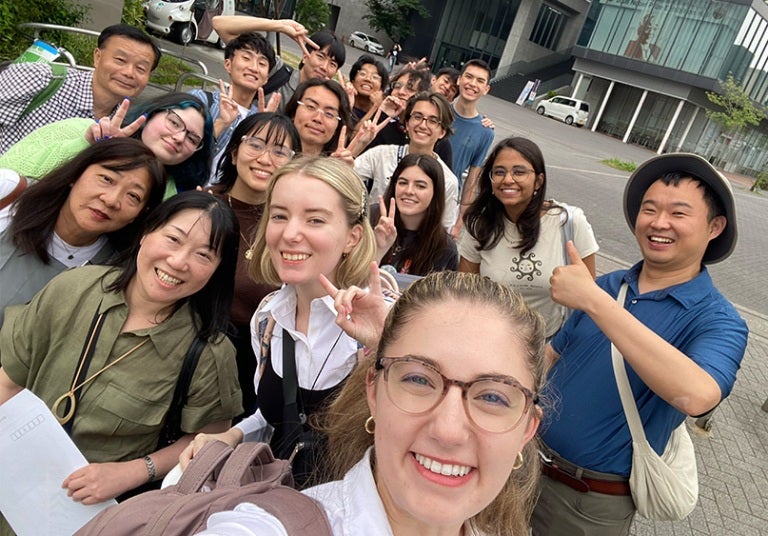
June in Japan
The research team is made up of 14 students and led by three faculty team leaders: Junfeng Jiao, associate professor in the School of Architecture; Ming Zhang, professor in the School of Architecture; and Junko Hatanaka, assistant professor of instruction in the College of Liberal Arts’ Department of Asian studies.
To kick off their monthlong research trip, the team started in Tokyo, remaining for a week before heading southwest to Nagoya, where Toyota originated. Their research then took them to Japan’s south-central region of Kansai, where they spent time in Osaka, Kyoto and Nara.
“We stayed in a traditional Japanese house after leaving Osaka,” Sarah said. “Then we went up to the northernmost island of Japan, Hokkaido, where we spent time in Sapporo and Hakodate. Getting to interact with universities, companies and organizations helped us narrow the scope of our project and understand what is feasible.”
She added, “I know big companies might not necessarily prioritize a group of undergraduate students, but we had so many specific, local experiences — from lectures at universities all around Japan to tours of a traffic control center. Getting both the technical and cultural experience continues to inspire our research.”
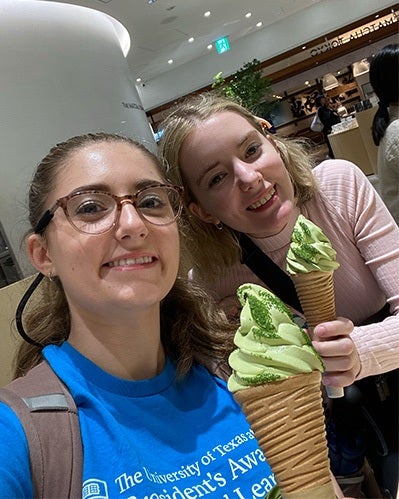
The cultural aspect of the trip was an inspiration for the sisters. Besides eating their weight in sushi, Sarah and Sophia also enjoyed exploring public parks, perusing vintage stores and spending time with several new friends they made in Japan.
“We’re still in contact with them, which has been so amazing,” Sarah said. “In terms of favorite food, broiled eel over rice is probably the most delicious thing I’ve ever eaten in my entire life. The vintage clothing scene was also great. I found so many cool pieces my grandmother said she wore in the ’60s and ’70s.”
Sophia added, “I loved the parks and public transportation. I would step outside, pick a direction and walk, either by myself or with a group of friends. I think Sarah and I grew a lot during that trip by stepping out of our comfort zones.”
Adapting to New Teams
The student team members were divided into groups to tackle three primary research areas: smart mobility, smart homes and robotics applications. Sarah and Sophia, who were originally in the same research group, were split up after a scheduling conflict prevented their final group member from making the trip.
“Initially, we were a little worried about how our majors and our skills would fit in with these groups of people we weren’t familiar with,” Sarah said. “The professors put us there for a reason; thankfully, I ended up in a group that needed someone who approached the project from a liberal arts perspective.”
The pivot required Sarah and Sophia to transition from their original focus, which had revolved around retrofitting Austin to become more accessible to people with disabilities with the implementation of human-centric design from Japan. Adapting to meet the group's needs shifted that focus.
Sarah added, “My group’s project focuses on highway management and disaster response. I found a way to contribute, especially by looking at it from the humanities side, taking into account Japan’s infrastructure and why people [there] tend to be more drawn to public transportation and trains.”
Sophia also admits to feelings of uncertainty around adjusting to a new group on the fly, though her trepidation quickly cleared after she learned that her new team needed a STEM-centric member.
“They were in need of an engineering perspective, but they were also kind enough to amend the project,” Sophia said. “The new idea was to research the technology used in Japan’s natural disaster communication, which is accessible for people with disabilities and the country’s aging population.”

Exploring Abroad with Texas Global
For Sarah, the President’s Award sent her on her first-ever experience abroad. As an Asian studies major, she knew it was only a matter of time before she studied abroad, but Sarah wasn't convinced this opportunity would come to fruition after she submitted her application.
“Initially, I thought the application process would be way too competitive and that my résumé wouldn’t be good enough,” Sarah said. “At the same time, finding this project that combines our interests felt like UT was saying, ‘OK, Snapp sisters, you both have to apply for this program.”
Spending June in Japan was Sophia’s second consecutive summer traveling abroad with Texas Global. As part of a humanitarian engineering program offered by the Projects with Underserved Communities (PUC) initiative, Sophia spent two weeks in Costa Rica in Summer 2023.
In Lorena, Costa Rica, the PUC team fundraised, designed and built changing rooms for a soccer field, a hub for the community in the Guanacaste region. As the team’s technical designer, Sophia drafted the design with guidance from professional engineering advisors and professors.
“They wanted to host games to bring in revenue to the community, so now each team has their own space to get ready for the game,” Sophia said. “It was a lot of fun getting to work with the kids, parents and contractors in the community. That experience helped me a lot with our current project in Japan.”
Sophia added, “While we were in Japan, I wanted to learn as much as I could about the culture and not impose any of my views. I wanted to foster partnership, and approaching this experience with that mentality has helped me so much.”
Growing Together
Sarah and Sophia return to Japan with the President’s Award team in December to wrap up their research before the next cohort of faculty and students launch their 2025 projects. UT Austin has invested into this ambitious program more than $4.3 million, which has supported 187 undergraduate students and 60 faculty members with projects in 19 countries.
“The President's Award for Global Learning is a transformative experiential learning opportunity where students can collaborate with interdisciplinary faculty and partners abroad,” said Laura Caloudas, assistant director of experiential learning at Texas Global. “Sophia and Sarah demonstrated an exemplary commitment to their projects, exploring smart city technology in Japan. We are excited for them to share what they’ve learned with the campus community.”
Sarah describes their President’s Award experience as a “once-in-a-lifetime opportunity” and encourages students to search and apply for additional study abroad opportunities.
“Explore a country and its culture while you are studying abroad,” Sarah said. “Don’t impose limitations on yourself or on what the experience abroad can be, and stay open to what a program and country have to offer.”
In addition to what they’ve gained through experiential learning, Sophia remains grateful for the opportunity to connect with Sarah and understand her sister’s love for the country and region she is studying.
“Previously, I never got to connect with her on something that is so important to her, which is her study of Japanese, and getting to travel together was incredible,” Sophia said. “I not only learned about myself, but I also got to see a part of [her] world, and I thought that was beautiful.”

